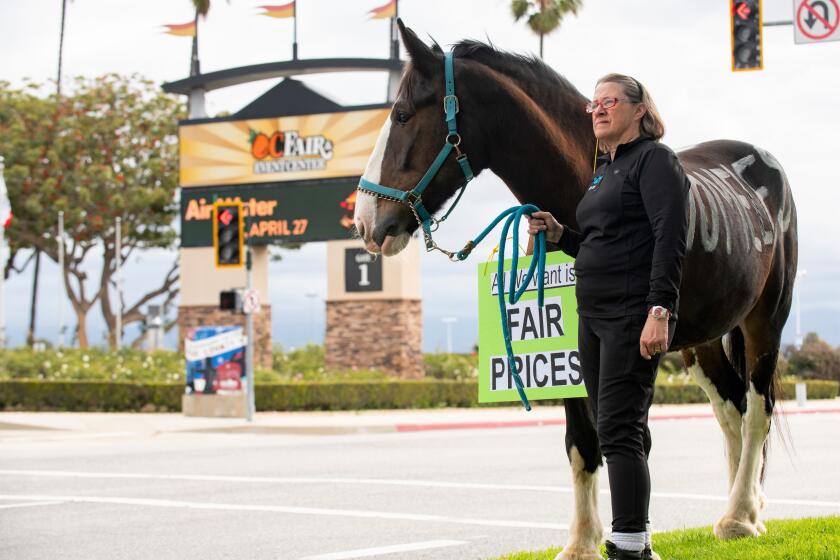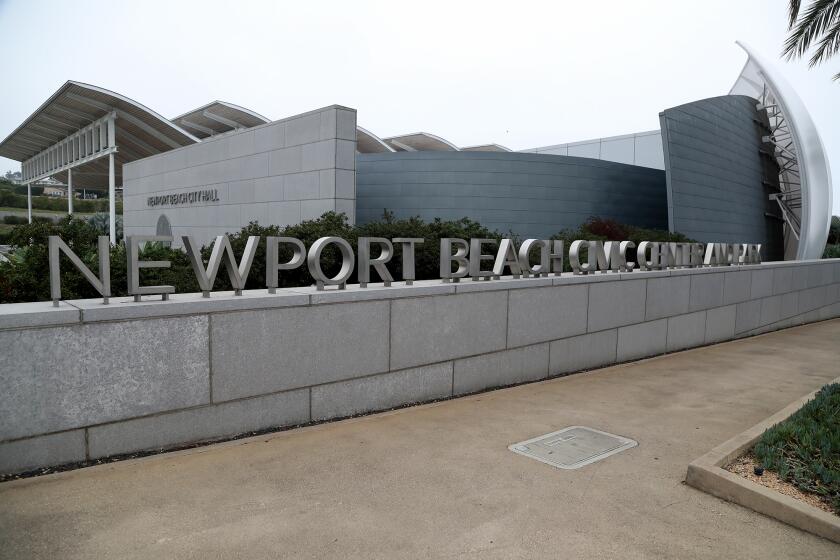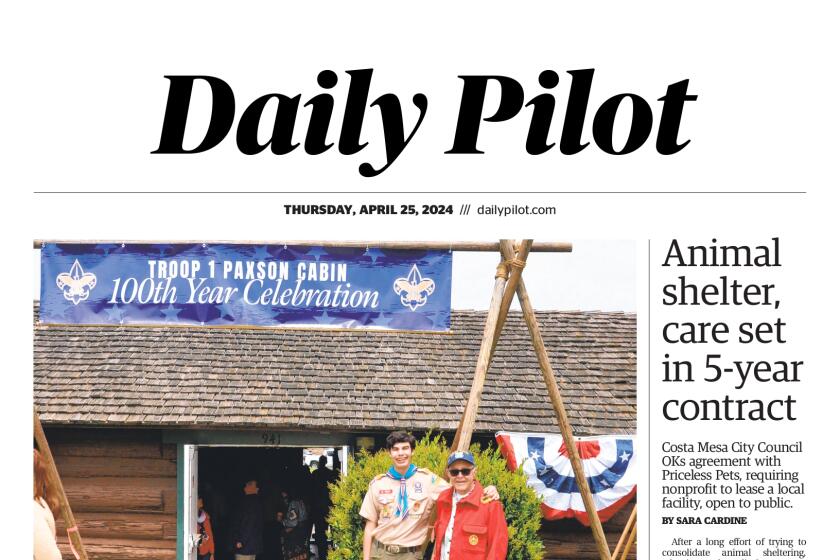Newport Beach cuts one option, adds another in search for potential homeless shelter site
Newport Beach will not build a homeless shelter on a former motel site, though three other properties are in play.
The City Council on Wednesday night eliminated the old Pine Knot Motel at 6302 W. Coast Hwy. as a possible location for redevelopment as a temporary homeless shelter because the site’s immediate proximity to the beach would trigger a review by the California Coastal Commission that could take months.
The council is moving ahead with negotiations for a location at 4200 Campus Drive, currently an Avis rental car lot near John Wayne Airport, and it did not eliminate the option of renting a warehouse at 825 W. 16th St., just off Placentia Avenue.
Those possibilities were announced last week. Another candidate entered the field Wednesday as the council said it will explore converting part of a city-owned maintenance yard at 592 Superior Ave.
The council met to discuss the start of negotiations to lease a site that could be used as a shelter, a necessary step before Newport could resume enforcing anti-camping ordinances that bar homeless people from sleeping in the open in public spaces such as parks, sidewalks and bus stations — an increasingly visible occurrence in town.
The rejection of the Pine Knot site was welcome news to residents of the nearby Newport Shores neighborhood.
The other possible locations had plenty of opponents too. The meeting drew such interest that police officers directed traffic around the City Hall driveway and the fire marshal directed people out of the packed main auditorium to an overflow room, which also filled.
Several parents of Carden Hall elementary and middle school students said the 16th Street location would pose a risk to the children about a quarter-mile away. Pacifica Christian High School and a Coastline Community College campus also are within about a half-mile of the warehouse. Nearby businesses in the mixed-use, industrial and residential area were also opposed.
Wende Zomnir, a founder of Urban Decay, owns several properties composing the global makeup brand’s headquarters next to the 16th Street property. She said a homeless shelter would put the company’s 150 employees, mostly women, at risk and that it would be hard to fill open positions.
“We film a lot of videos there. We have international visitors ... and influencers from all over the world that come” to Urban Decay, which is owned by cosmetics giant L’Oreal. “It would definitely hurt our image as a brand.”
Representatives of airport-area businesses, including the Benihana restaurant and the Hyatt Regency John Wayne Airport hotel, spoke against the Campus Drive location.
“Our business, along with several others, produces significant transient occupancy tax and sales tax revenue in the city of Newport Beach and we believe that having a shelter so close to our hotel and several others in both Newport Beach and Irvine would have an adverse effect on our ability to book conferences, group meetings, conventions and social events, which are the main source of our revenue,” said Jan Hollis, representing the Hyatt. “Let’s protect our tourism dollars for Newport Beach.”
One woman who declined to give her name said it isn’t necessary to have a shelter anywhere in Newport Beach.
“We have lots of land in the entire state of California. No one’s considered going to the desert and creating a nice community there with everything they need so that they can start a new life out in the desert area with open space,” she said. “There should not be a shelter whatsoever in the beautiful city of Newport Beach. We have a nice, clean, precious city.”
But Councilman Brad Avery, who moved to eliminate the Pine Knot site, which is in his western Newport district, said: “We cannot round everybody up and take them to the desert. Sorry.”
Whatever the city does, it has to offer shelter before it can enforce anti-camping laws.
“My sole goal in pushing for this meeting and pushing for these locations, along with Mayor [Diane] Dixon and other members of the council, is purely to bring safety to the streets,” Councilman Kevin Muldoon said.
Councilman Jeff Herdman said homelessness is a permanent part of society and that the city needs to address it directly. “I predict that councils way into the future will have a line item in the general fund budget to pay for homeless costs on an annual basis,” he said.
Resident Paul Matheis said Herdman’s words resonate.
“Homelessness is not going away,” Matheis said. “Components that lead to it don’t seem to be going away any time soon.”
In addition to negotiating for the Campus location, city staff will research what it would take to repurpose the maintenance yard on Superior Avenue.
So far this year, the city has launched a homelessness task force, committed $1 million over the next five years to a contracted social services provider to assist with homelessness outreach and housing placement, and negotiated for Hoag Hospital to contribute $3 million over 10 years toward a potential homeless shelter as a condition of the hospital’s development agreement with the city.
“We’ve done a lot, but it’s clearly not enough,” said Mayor Pro Tem Will O’Neill, who chairs the city’s homelessness task force. “We need to move quickly, but not so quickly that we make decisions that are bad and stain us for years to come.”
In addition to the identified local properties, regional approaches such as sharing a facility with a neighboring city could provide possible solutions.
Some other area cities, including Costa Mesa and Huntington Beach, have or are pursuing new homeless shelters. The recent surge comes with prompting from local U.S. District Judge David Carter, who has presided over lawsuits filed around Orange County by homeless advocates. Carter has repeatedly urged county and city officials to develop plans for expanding the number of emergency shelters and to not enforce local anti-camping bans or cite homeless people for sleeping or setting up camp in public if there are no shelters nearby.
A 2018 ruling by the U.S. 9th Circuit Court of Appeals restricts cities from prosecuting people for sleeping on public property if no shelter beds are available. That means Newport Beach, like other cities in the West, is constrained on how it can clear homeless people from the streets.
All the latest on Orange County from Orange County.
Get our free TimesOC newsletter.
You may occasionally receive promotional content from the Daily Pilot.




